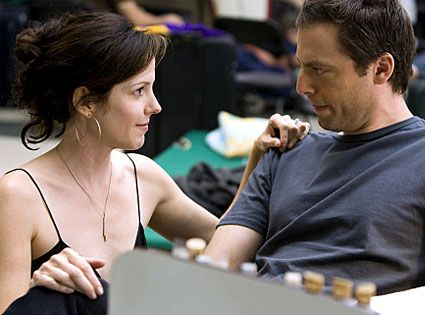
A Gentle Soul with Fierce Strength
Mary-Louise Parker brought quiet dignity, unwavering loyalty, and emotional complexity to the role of Ruth Jamison in Fried Green Tomatoes. Her performance alongside Mary Stuart Masterson (Idgie Threadgoode) elevated the film’s depiction of female friendship and resilience. But beyond her portrayal of Ruth, Parker’s real-life journey is one of artistic integrity, deep introspection, and a consistent commitment to meaningful storytelling.
Early Life and Artistic Calling
Mary-Louise Parker was born on August 2, 1964, in Fort Jackson, South Carolina. Her father was a judge in the U.S. Army, which meant her family moved frequently during her childhood—living in places like Tennessee, Texas, Thailand, Germany, and France. This transient upbringing shaped her worldview and perhaps instilled the quiet sensitivity she would later bring to her acting roles.
She studied drama at the North Carolina School of the Arts, where her artistic path became clear. From early on, Parker was drawn not to the limelight, but to roles that carried emotional weight and human complexity. Her desire was never simply to entertain but to convey truth—and she has done just that throughout her career.
Breakthrough in Fried Green Tomatoes

In 1991, Mary-Louise Parker took on the role of Ruth Jamison, a gentle Southern woman trapped in a controlling marriage, who finds freedom, friendship, and love in her bond with Idgie Threadgoode. Ruth is more than just a supporting character—she is the moral center of the story. Her compassion, vulnerability, and quiet strength allow the film’s themes of healing, community, and defiance to flourish.
Parker’s performance was acclaimed for its subtlety. She didn’t need to overstate Ruth’s pain or her loyalty. Every glance, every touch, every tremor in her voice told the audience who Ruth was: a woman who had endured abuse, loved deeply, and ultimately sacrificed herself for those she loved. Her chemistry with Masterson created one of the most emotionally charged and enduring relationships in 1990s cinema.
Career Beyond the Café
After Fried Green Tomatoes, Parker’s career only grew stronger. She went on to take varied and daring roles on stage and screen. Her work on Broadway garnered critical acclaim, including a Tony Award for Best Actress in 2001 for Proof, where she played a troubled but brilliant mathematician wrestling with loss and inheritance.
In television, she earned widespread recognition for her role as Nancy Botwin in Weeds, a dark comedy that ran from 2005 to 2012. As a suburban widow who turns to selling marijuana to support her family, Parker demonstrated her remarkable range—navigating comedy, drama, and satire with ease. The role earned her a Golden Globe and multiple Emmy nominations.
Other notable performances include Angels in America, for which she won both an Emmy and a Golden Globe, and the film The Client, where she starred opposite Susan Sarandon. Whether on the stage, television, or big screen, Parker’s work has consistently centered around complex, intelligent women facing personal crossroads.
A Private Life, Authentically Lived
Though Parker has been in the public eye for over three decades, she has remained fiercely private. She has never been drawn to tabloid attention and rarely discusses her personal life in interviews. That said, her 2015 memoir Dear Mr. You gave fans rare insight into her inner world. Structured as a series of letters to men—both real and imagined—who shaped her life, the book revealed her as introspective, witty, and unafraid of emotional exposure.
She has two children—one biological son with actor Billy Crudup and an adopted daughter from Ethiopia. Parker’s journey through motherhood, single parenting, and adoption is deeply personal, and she has spoken with grace and clarity about the challenges and joys of raising her children outside the spotlight.
Quiet Advocacy and Artistic Purpose
While not a loud activist, Mary-Louise Parker has supported a variety of humanitarian and artistic causes. She has lent her voice to AIDS awareness campaigns, women’s rights, and arts education. Her work often speaks louder than her words: by consistently portraying nuanced female characters, she has expanded the space for complex women in popular storytelling.
In many ways, she has echoed the emotional depth she brought to Ruth Jamison throughout her career. Just like Ruth, Parker does not shout to be heard. She moves with quiet strength, compelling truth, and unshakable dignity—whether in front of the camera or behind the scenes.
Legacy of Ruth and Mary-Louise Parker
For many fans of Fried Green Tomatoes, Ruth Jamison remains one of the film’s most beloved characters—not just because of the script, but because of what Mary-Louise Parker infused into her. She gave Ruth vulnerability without victimhood, love without sentimentality, and a sense of grace that never felt forced. In many ways, Ruth embodied the best of Parker’s own artistic soul.
And while Parker has gone on to achieve broader fame in roles like Nancy Botwin, it is her early work in Fried Green Tomatoes that continues to resonate across generations. The story of Idgie and Ruth remains a cultural touchstone for friendship, resilience, and love that transcends boundaries.
Final Thoughts: The Woman Behind the Grace
Mary-Louise Parker’s career stands as a testament to artistic integrity and emotional bravery. She has never taken the easy route—opting instead for roles that challenge both her and the audience. In portraying Ruth Jamison, she delivered a performance that continues to heal, comfort, and inspire decades after its release.
For viewers who saw Fried Green Tomatoes as young adults and return to it years later, Ruth remains a symbol of quiet endurance and unwavering love. And Mary-Louise Parker—whose soulful presence gave Ruth her heartbeat—continues to be one of the most respected and quietly powerful actresses of her generation.
